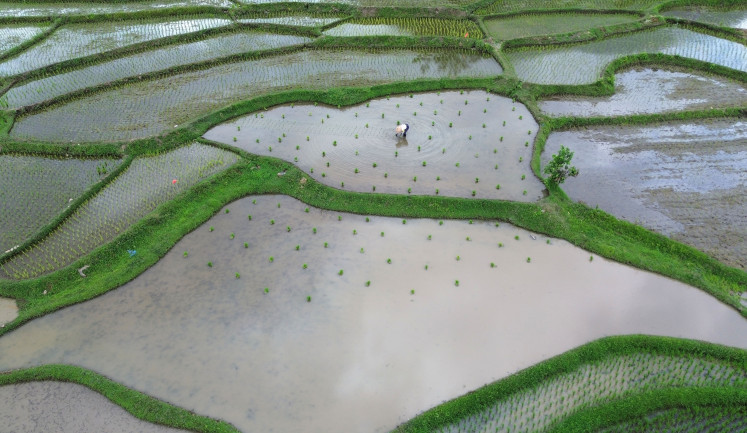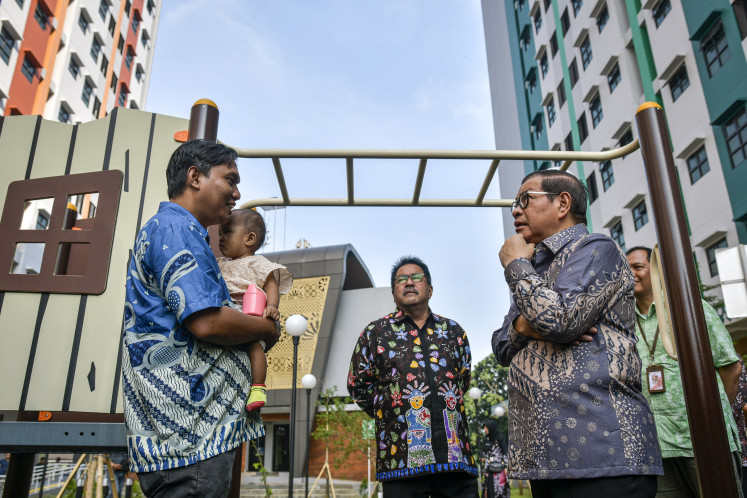Popular Reads
Top Results
Can't find what you're looking for?
View all search resultsPopular Reads
Top Results
Can't find what you're looking for?
View all search resultsThe changing global landscape post COVID-19 and its implications
Those who championed internationalism once promised a world of winners, a more inter-connected society where international cooperation would triumph over disputes. However, with the recent geopolitical fragmentation and inward-looking policies sweeping across nations, the COVID-19 pandemic may have shattered this fantasy.
Change text size
Gift Premium Articles
to Anyone
 Australian Prime Minister Scott Morrison (top right) is seen on a screen attending a videoconference with G20 leaders to discuss the COVID-19 coronavirus, at Parliament House in Canberra on March 26. Leaders of the G20 major economies held the online summit in a bid to fend off a coronavirus-triggered recession, after criticism the group had been slow to address the crisis.
(AFP/Pool/Gary Ramage)
Australian Prime Minister Scott Morrison (top right) is seen on a screen attending a videoconference with G20 leaders to discuss the COVID-19 coronavirus, at Parliament House in Canberra on March 26. Leaders of the G20 major economies held the online summit in a bid to fend off a coronavirus-triggered recession, after criticism the group had been slow to address the crisis.
(AFP/Pool/Gary Ramage)
T
he unprecedented COVID-19 pandemic is a powerful reminder of how the international community is heavily interconnected and vulnerable. No country, no matter how powerful or prosperous, can overcome this cross-border pandemic alone. Now, the world faces one common enemy: COVID-19.
Those who championed internationalism once promised a world of winners, a more inter-connected society where international cooperation would triumph over disputes. However, with the recent geopolitical fragmentation and inward-looking policies sweeping across nations, the COVID-19 pandemic may have shattered this fantasy.
The fact is that this global pandemic will create both winners and losers. Those who cannot survive will become obsolete.
Thus, a clear consequence of this tragic pandemic is a change in the behavior of the international community. In this regard, the pandemic has created political, economic, social and cultural shifts that have changed the global landscape. These shifts are certainly worrying, but they also present opportunities to those who can navigate smartly through these challenges.
Nowadays, we see rising digital engagement with various online platforms. Recent high-level meetings of the Group of 20, ASEAN and ASEAN Plus Three, as well as the Non-aligned Movement (NAM) reflect the increasing global dependency of online platforms as a means of communication during the pandemic.
While this has indeed assisted societies to engage with one another, it also poses some salient challenges, at least from an economic and security standpoint. First, it has created a new divide or economic gap, between the haves and haves not with regard to the technology. In other words, countries that are economically more advanced with digital ecosystems already in place, will certainly be at an advantage compared with those who do not have this luxury.
Increasing digital utilization also faces another challenge in the realm of cybersecurity. With more than half a million Zoom accounts sold in the dark web, digital privacy and consumer protection are definitely at risk. Interpol identifies that there are at least three types of cybercrimes flourishing amid COVID-19: malicious domains (creation of fake domains to carry out spamming and phishing), malware (embedded in coronavirus maps, websites and spam emails) and ransomware (infected attachments that attack critical medical and public institutions).
There are also concerns whether the pandemic will give room and even exacerbate violent extremisms, xenophobia and narrow nationalism.
The example of the “blame game on the origins of the virus” between the two most powerful economies illustrates how this pandemic is also becoming a dangerously politicized agenda. However, there are also other worrying trends in other regions.
In the Middle East region, for example, some countries are blaming others for the increase in coronavirus cases and even for spreading the outbreak. If not settled amicably, this region could fall into deeper political sectarian conflict.
Notwithstanding the social costs, according to a paper published by the United Nations University World Institute for Development Economic Research (UNU-WIDER), the economic impact of COVID-19 could increase global poverty for the first time in three decades, pushing more than half a billion people, 8 percent of all humanity, into poverty.
This study shows that the achievement of the 2030 sustainable development goals (SDGs) agenda, particularly on no poverty and zero hunger, could well be under considerable threat. In essence, COVID-19 could reverse a decade of global progress toward reducing poverty.
In addressing the challenges above, the international community needs to show a united front with a forward-looking and collaborative approach. The following are several pertinent areas of cooperation to mitigate COVID-19 while also addressing the SDGs.
First, international cooperation is needed to create a safer digital ecosystem for information sharing. Furthermore, joint efforts are needed to strengthen cyber risk-management measures to effectively counter cyber threats and prevent or mitigate attacks on critical information infrastructure. A legal debate over the much-needed international legal regime and application of international law to cyberspace must also be revived.
Second, in combatting this common enemy, spreading the culture of peace and tolerance is essential. There should be no room for divisions when our focus should be on how we can together manage and beat this virus.
Third, is to increase political coordination to better manage this crisis and to be collectively prepared for future pandemics at the regional and global level. The world democracies must show their leadership in taking part to resolve the pandemic through a democracy-led process that promotes multilateral avenues.
Recent G20, ASEAN and NAM summits showed that their spirit is geared to attaining this common goal. The ASEAN and ASEAN+3 summits last month identified proposals to establish an ASEAN COVID-19 response fund, an ASEAN+3 pandemic task force and an ASEAN+3 reserve of essential medical supplies. While the recent NAM summit agreed to establish a task force to develop a database of medical and humanitarian needs of NAM countries. Realization of these joint commitments will become a testament to how strengthening multilateralism will go far and beyond.
Fourth, in addressing poverty, while installing the right economic incentives, stimulus packages and social safety nets have been the means to build economic resilience; bolstering bilateral trade and investment ties are also paramount.
As industries are reorienting and diversifying lines of production, they are also expanding the scope of their cooperation across borders to better adapt to the changing global supply and demand shock.
In this regard, governments are exploring and facilitating innovative ways to strengthen economic cooperation with partner countries, to fulfill needs of priority medical supplies and medicine.
Innovative cooperation between Indonesia and partner countries such as South Korea, Japan India and the UAE are a few examples.
Indonesia and South Korea are working together in the joint production of personal protection equipment (PPE), ventilators and masks. In this regard, raw materials are imported to Indonesia and then converted into final products.
Cooperation between Indonesian state-owned enterprises with Japanese and Indian companies is also taking place in the procurement of pharmaceutical ingredients for COVID19 medicines.
While the provision of medical supplies assistance from the UAE is also directly followed by its purchase of Indonesian agricultural and small and medium enterprises’ products. This certainly highlights how international cooperation can go a long way. Not only to fulfill one country’s necessities, but also for the greater global population.
In addressing the health crisis in developing countries, international cooperation is needed to help increase national capacities in the health sector as well as in obtaining medicines and medical supplies. The recent NAM summit called for the provision of “health care for all”, which calls for unhindered access to affordable medicine for developing countries. This is vital in the attainment of the SDGs. It is important that the most vulnerable get access to medicines in crisis situations
All in all, the need of the hour is to ensure that the changing global landscape will, in turn, support global efforts to stop the pandemic and prevent economic collapse. How well countries navigate through these challenges or capture opportunities by strengthening international cooperation will eventually determine success in defeating this common enemy. Thus, the global community must stand under the one flag, that of cooperation.
***
Purna Cita Nugraha is deputy director for Middle East affairs in the Foreign Ministry, where Andi Sparringa works as a diplomat. The views expressed are their own.









